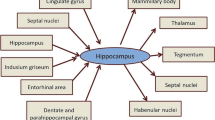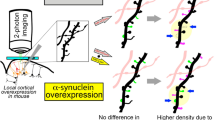Abstract
Cognitive disorders after epilepsy can have a great impact on the quality of life of epileptic patients, though it has not drawn much attention. Even after identified, it is often undertreated or has gone untreated. Memantine has been approved to treat moderate to severe Alzheimer disease (AD), which is characterized by cognitive impairment. In present study, we determined the effects of memantine on PTZ-kindled rats, which can mimic the postseizure dysfunction that resembles symptoms observed in human epilepsy. We found that memantine can ameliorate the spatial learning and memory of epileptic rats. But contrary to previous claims that memantine can improve cognition in AD patients, without serious side effects on normal learning and memory abilities, we found that rats treated only with memantine exhibited the impaired spatial learning and memory ability. We conclude that memantine can improve cognition related to an excitotoxicity-induced pathologic state, but the potential side effects of memantine on the physiological processes should be considered.

Similar content being viewed by others
References
Soria C, Callu D, Viguier D, SEl Sabbagh, Bulteau C, Laroussinie F, Dellatolas G (2008) Parental report of cognitive difficulties quality of life and rehabilitation in children with epilepsy or treated for brain tumour. Dev Neurorehabil 11:268–275
Aldenkamp AP, Bodde N (2005) Behaviour, cognition and epilepsy. Acta Neurol Scand Suppl 182:19–25
Elger CE, Helmstaedter C, Kurthen M (2004) Chronic epilepsy and cognition. Lancet Neurol 3:663–672
Motamedi G, Meador K (2003) Epilepsy and cognition. Epilepsy Behav Suppl 2:S25–S38
Kohr G (2007) NMDA receptor antagonists:tools in neuroscience with promise for treating CNS pathologies. J Physiol 581:1–2
Ott BR, Blake LM, Kagan E, Resnick M (2007) Open label, multicenter, 28-week extension study of the safety and tolerability of memantine in patients with mild to moderate Alzheimer’s disease. J Neurol 254:351–358
Peskind ER, Potkin SG, Pomara N, Ott BR, Graham SM, Olin JT, McDonald S (2006) Memantine treatment in mild to moderate Alzheimer disease: randomized, a 24-week controlled trial. Am J Geriatr Psychiatry 14:704–715
Atri A, Shaughnessy LW, Locascio JJ, Growdon JH (2008) Long-term course and effectiveness of combination therapy in Alzheimer disease. Alzheimer Dis Assoc Disord 22:209–221
Schmitt FA, van Dyck CH, Wichems CH, Olin JT (2006) Cognitive response to memantine in moderate to severe Alzheimer disease patients already receiving donepezil: an exploratory reanalysis. Alzheimer Dis Assoc Disord 20:255–262
Mortazavi F, Ericson M, Story D, Hulce VD, Dunbar GL (2005) Spatial learning deficits and emotional impairments in pentylenetetrazole-kindled rats. Epilepsy Behav 7:629–638
Wang P, Wang WP, Zhang S, Wang HX, Lou Y, Fan YH (2008) Impaired spatial learning related with decreased expression of calcium/calmodulin-dependent protein kinase IIαand cAMP-response element binding protein in the pentylenetetrazol-kindled rats. Brain Res 1238:108–117
Chen HS, Wang YF, Rayadu PV, Edgecomb P, Neill JC, Segal MM, Lipton SA, Jensen FE (1998) Neuroprotective concentrations of the N-methyl-d-aspartate open-channel blocker memantine are effective without cytoplasmic vacuolation following post-ischemic administration and do not block maze learning or long-term potentiation. Neuroscience 86:1121–1132
Danysz W, Parsons CG (2003) The NMDA receptor antagonist memantine as a symptomological and neuroprotective treatment for Alzheimer’s disease: preclinical evidence. Int J Geriatr Psychiatry 18 Suppl 1: S23–S32
Reisberg B, Doody R, Stoffler A (2003) A randomized, placebo-controlled study of memantine, an uncompetitive NMDA antagonist in patients with moderate to sever Alzheimer’s disease. N Engl J Med 348:1333–1341
Tariot PN, Farlow MR, Grossberg GT, Graham SM, McDonald S, Gergel I (2004) Memantine treatment in patients with moderate to severe Alzheimer disease already receiving donepezil: a randomized controlled trial. JAMA 291:317–324
Creeley C, Wozniak DF, Labruyere J, Taylor GT, Olney JW (2006) Low doses of memantine disrupt memory in adult rats. J Neurosci 26:3923–3932
Racine RJ (1972) Modification of seizure activity by electrical timulation II motor seizure. Electroencephalogr Clin Neurophysiol 32:281–294
Morris R (1984) Development of a water-maze procedure for studying spatial leaning in the rat. Neurosci Methods 11:47–60
Huang LT, Yang SN, Liou CW, Hung PL, Lai MC, Wang CL, Wang TJ (2002) Pentylenetetrazol-induced recurrent seizures in rat pups: time course on spatial learning and long-term effects. Epilepsia 43:567–573
Lieberman JA, Papadakis K, Csernansky J, Litman R, Volavka J, Jia XD, Gage A (2009) MEM-MD-29 Study Group, A randomized, placebo-controlled study of memantine as adjunctive treatment in patients with schizophrenia. Neuropsychopharmacology 34:1322–1329
Wroolie TE, Kenna HA, Williams KE, Powers BN, Holcomb M, Lazzeroni L, Rasgon NL (2009) Cognitive effects of memantine in postmenopausal women at risk of dementia: a pilot study. Acta Neurol Scand 119:172–179
Jevtovic-Tedorovic V, Wozniak DW, Benshoff ND, Olney JW (2001) Comparative evaluation of the neurotoxic properties of ketamine and nitrous oxide. Brain Res 895:264–267
Acknowledgments
We are grateful to Mr. Chao Wang and Mrs. Hui-xin Zhang for technical help. This project was financially supported by the Natural Science Foundation of Hebei Province, P.R. China NO:C200-7000852) and Hebei Key Technologies R & D Project of China (NO:07276101D-21).
Author information
Authors and Affiliations
Corresponding author
Rights and permissions
About this article
Cite this article
Jia, LJ., Wang, WP., Li, ZP. et al. Memantine attenuates the impairment of spatial learning and memory of pentylenetetrazol-kindled rats. Neurol Sci 32, 609–613 (2011). https://doi.org/10.1007/s10072-011-0561-0
Received:
Accepted:
Published:
Issue Date:
DOI: https://doi.org/10.1007/s10072-011-0561-0




